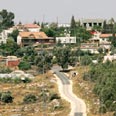
West Bank settlement
Photo: AP
Worried West Bank settlers try wine and a bus tour
Settlers woo foreign journalists with visit to home overlooking site where biblical Israelites housed Moses' stone tablets; 'Arabs already have enough states,' they say, 'governments come and governments go. What we're doing here is something that's permanent'
Israel's West Bank settlers have been ratcheting up their violence, defying their own government and flouting international public opinion.
High Court Ruling
Right-wing activists say they have no intention of complying with High Court ruling they must evacuate disputed property, agree on series of measures to counter expected forced evacuation. Extremists Marzel, Federman vow settlers will fight, pledge 'Greater Israel will be realized'
But on Monday a settler group tried another tack - wooing foreign journalists with a bus tour featuring a glass of merlot and a visit to a home overlooking the site where the biblical Israelites housed Moses' stone tablets.
"Here you see the miracles and the prophecies actualized in front of you," said settler Tamar Yonah Feld, portraying Jewish settlement in the West Bank as a fulfillment of God's will.
The settlers said they wanted to show the world they are just trying to have peaceful lives. But the bulletproof windows on the bus, the ubiquitous barbed wire and the watch towers at settlements betrayed an existence that is anything but normal.
Despite the wine, a mouthwatering lunch and an earnest video on the land's Jewish roots, the interaction with the visitors was often heated.
Journalists peppered the settlers with questions like "Don't the Palestinians have a right to a state?" and "How can Israel hope to remain both Jewish and democratic if it continues to rule over another people who will soon outnumber Israelis?"
The answer to the first question was invariably, "No." Arabs already have enough states, settlers said.
Responding to the second question, some settlers said Israel doesn't need to be democratic. Others said they expected Jews from around the world to come to Israel to ensure a Jewish majority.
Eliana Passentin, a 35-year-old mother of six who was raised in San Francisco, invited reporters into her home in the settlement of Eli, offering cookies and blue pens marked "From Eli with friendship."
To get to the house, the journalists passed a swimming pool, basketball and tennis courts, a Jewish seminary, kindergartens and a poster of Meir Kahane, the slain extremist leader who advocated the forcible expulsion of Arabs.
Passentin's house, featuring modern furniture and fine tiles cemented into built-in benches, overlooks ancient Shiloh, for which a modern settlement nearby is named and where tradition holds the ancient Israelites kept the tabernacle with Moses' tablets. She said her dining room was situated to make maximum use of that view.
"We love living here. We love this land," Passentin said.
'We intend to stay'
Later, the reporters were taken to the ancient site to watch a video and hear an archaeologist describe the Jewish connection to the land.
Israel captured the West Bank, Gaza Strip and other Arab territory in the 1967 Mideast war and, after initially holding off, eventually began moving its citizens into the territories. Today nearly 300,000 Jewish settlers live among 2.3 million Palestinians in the West Bank, in addition to about 180,000 Israelis living in east Jerusalem neighborhoods also captured in 1967.
Much of the world and a sizable portion of the Israeli public, including Prime Minister Ehud Olmert, now say many of the settlements will have to be dismantled to make room for a Palestinian state, just as 8,000 settlers were evicted from the Gaza Strip three years ago.
That is not going to happen, vowed Avi Roeh, head of the local settler government that conducted Monday's tour.
"Governments come and governments go. What we're doing here is something that's permanent. We intend to stay," he said.
The settlements, interspersed among Palestinian communities across the West Bank, are easily recognizable with their red-tile roofs, manicured gardens and neat rows of cookie-cutter houses.
Their existence and the hardships they cause Palestinians _ including extensive restrictions on Palestinians' freedom of movement to protect settlers from militants _ have drawn comparisons to the apartheid racial separation system when South Africa was ruled by whites.
But settler David Feld, who identified himself as a former colonel in the US Air Force, said any Israeli withdrawal from the West Bank would lead to more violence by Palestinians. He pointed to the Gaza Strip, where a 2005 Israeli pullout was followed by a takeover by Hamas militants and an increase in the number of rockets fired into Israel.
"Now you don't see a single Jew in Gaza. And what did we get in return? Bombs, bombs and bombs," Feld said.
Hoping to swing more Israelis behind them, settlers have taken out radio ads and put up billboards highlighting the ancient Jewish connection to Judea and Samaria _ the biblical term for the West Bank.
At the same time, other settlers less concerned with their image are conducting a more ominous campaign, with young extremists stepping up attacks on Palestinians and even hurling abuse at Israeli soldiers, who would be in charge of removing settlers if it ever comes to that.
The settler group behind Monday's tour sought to put a happy face on the situation, however. At the settlement of Ofra, reporters were taken to a winery's dark, stonewalled cellar and offered samples of $40 bottles of merlot, cabernet sauvignon and chardonnay.
Yoram Cohen, the 47-year-old proprietor, said he wasn't concerned about someday being forced to leave _ or the fact that many foreigners are reluctant to buy Israeli wine made in disputed territory like the West Bank.
"I don't live with worrying. I live with living," he said.















